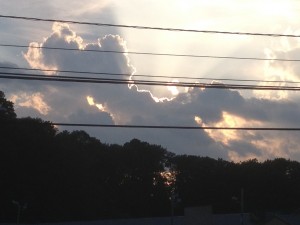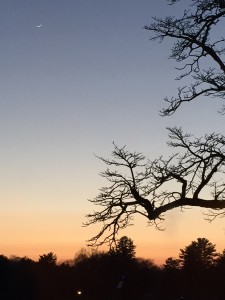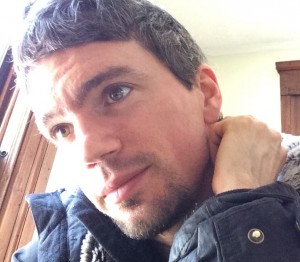by Ben Ross
What I Want More Than Anything Else
Sometimes I think what I want more than anything else is to be rejected, and find out if love is here anyway – to fail, and find out if there’s an acceptance larger than achievement – to actually miss out on life, until I can see if there’s something here that can’t be left behind.
It’s not that I’m a masochist (I don’t consciously seek out rejection, but seem to be drawn to it at times by a deeper longing). As far as I can tell, there’s something more basic that I really want to know, which is whether there’s a love I can experience directly that extends beyond conditions, whether my worth and identity really are based on others’ approval, whether I really can be cast out from acceptance, cut off from belonging, or fail in some way that proves the existence of a basic flaw in myself or in life.
Sometimes, in glimpses, it seems to me that love and acceptance, belonging and peace aren’t actually found in overcoming rejection, failure, or abandonment, but in surrendering control over them and seeing that acceptance is the background and substance of life already. And in this acceptance, seeing also that the feelings under and within rejection – that I so deeply fear and spend so much time and energy running away from – are actually my own life energy coming back to me.
I think that what seems to be “rejection” appears that way because the mind labels something with a negative word when the feelings under it seem too big to take in, and therefore need to be controlled, avoided or denied. At least it appears that they do to a body-and-mind that’s been through trauma, especially in the formative years of infancy and childhood.
Wounds at the Heart of Life
These wounds especially – the wounds of being unmet as an infant, of not having the experience of basic mirroring through expression, eye contact, and the basic oxygen of available presence – or of being held in a way that neither invades or neglects the range of feelings that are the basic language of life in infancy – are the ones that cut to the core of the sense of self, creating a deep conviction in the infant’s world of the inherent badness of basic life energy itself, and of the body that expresses it.
Often these wounds are enacted completely without intention on the caregiver’s part, but emerge as the expression of a culture that has wounded everyone’s heart and capacity for trust, acceptance and openness to our full range of feelings and capacity for connection for generations, and that continues to abandon caregivers, and threaten everyone’s safety and belonging through oppression of so many kinds.
Faced by such powerful feelings as the ones left by these wounds at the heart of life, the fear of rejection seems to be a defense that seeks to protect survival and a basic sense of stable or reliable reality itself.
One way to understand this is to say that the energy of any overwhelming experience (including overwhelming abandonment) gets locked away in the body-mind, isolated from new experience, connection, insight, and even awareness, whenever it happens in the life span, and with a huge extra jolt of power when it’s in the first years of life.
And the basic flow of this energy wants to move like rivers toward the ocean, seeking wholeness, and is felt as a basic longing to find a safe space where what was too big to hold can be welcomed back piece by piece, met with love, gentleness, and tender care.
In that safe space of acceptance, when my whole being is welcomed as it really is, the body shakes itself with the energy of life returning, tears and deep breaths are drawn into the belly, filling the lungs, old stories are seen as the movies they are, and new stories are brought to life, aligned with a compassionate understanding that emerges all on its own from the clarified seeing of what’s really true about people and the experience of being alive.
And until this space is found (and for me it’s been a space that needs to be returned to again and again over years of gradual work) the old trauma keeps playing out the past as if it’s present, seeking to ensure survival even at the cost of being truly present for the life that’s actually here in our body-minds, in relationships, creativity, play, connection to nature and each other.
Running from Love in Relationships
For me, there are so many times I’ve run from love, acceptance and belonging in one way or another.
There are times I’ve felt genuinely connected. Like when I was living with a group of male friends in Colorado, sharing openly the stories of our lives, looking forward to hearing what was up for them every day no matter whether it was despairing or absurdly funny – all of it good because real, connected, the actual texture, taste and variation of life itself.
And knowing I could share openly too, and be received, and belong, with all the glorious mess I was undeniably in at that time. I knew how deeply I was loved then, living with those guys (though I never imagined this could be possible with a group of men) and I left anyway.
Or when I was writing songs and performing with a group of supportive and wildly creative people in Western Mass, singing every day, working a job I loved, feeling a deep fulfillment and sense of connection in my bones. And then moving 2,000 miles away anyway.
Or when I stopped being in touch with a guidance counselor in high school who interpreted an intensely alive, beautiful and also overwhelming experience as a spiritual emergence rather than a manic psychosis (which it would later be labeled when I sought help from psychiatry for what I was at that time calling depression).
Without my guidance counselor’s empathy, his deep seeing, and his real friendship, I don’t know what I would have been put through, how broken I might have perceived myself as being, and what depths of life I may have missed out on.
And yet I drifted, afraid to get closer after this, losing touch because I couldn’t take the next step in deepening our relationship, the step of authentically voicing the pain within me as well as the experiences of intense flights into aliveness.
There are plenty of other times I could mention, when I ran from just-budding closeness, love, embodiment, belonging. I feel so much sadness and regret just listing these, feeling the weight of life and love that wasn’t given the chance to fully grow and live. But even to begin that list could make for a very long piece of writing.
Letting Go of Attempts to Control
The idea that I want to convey in sharing these stories, to put into conversation with whoever has run from love and belonging as I have, is that I think the reason people run is because there’s a desire that gets in the way of actually letting love in: the desire to control the possibility of rejection, betrayal or abandonment, and the painful feelings within and beneath these essentially empty words.
And I think there’s a kind of truth in this fear: love really isn’t in control. It really could lead to rejection, betrayal and abandonment. And all the feelings under them that we don’t want to feel could come back, overwhelming us, making it difficult to get through a day, an hour, a moment.
And it’s also possible to hold those feelings, and in holding to see that at heart, in actual experience, when they’re approached in a safe space and when the beliefs around them have been seen as no more than beliefs, that these feelings actually already are the love that we seek in others’ approval, in relationships, in belonging, in achievement, success, or ideological certainty.
And this love, when deeply welcomed, finds itself again and again and again wherever it is (even through all the running and steps back and lostness and denial) whether the finding of that moment occurs in an intimate relationship, or a friendship, or in nature, or the body itself, through practices of opening to presence with others or in the deep communion of solitude.
It seems love is naturally open to life in all in its contrasts, to connection in the midst of any condition, and that it wants, out of an overflow of its own nature, to create, share, and be of help to others.
I don’t know what would have happened if I’d stayed in Colorado living with those guys, or with my group of musician friends, or if I’d stayed in touch with my guidance counselor.
One of my friends in Colorado was thinking of leaving as well – maybe if I’d been committed to staying, he would have changed his mind, maybe not. Maybe we would have all stayed and just drifted apart. Maybe we would have started hating each other for some unpredictable reason. Maybe life would have taken us in different directions for any number of reasons – having kids, the illness of a family member, a sudden urge to move across the world – in any of these situations.
I can’t really know. Staying would be no guarantee of things working out – life is obviously way, way beyond my best-laid plans.
Risking Vulnerability
And within this uncertainty, knowing that no decision is a guarantee of anything, I want to take the risks that are true to my heart anyway, because that’s honest to who I really am, and I feel life throughout my body when I act from my actual self, and that life naturally spreads to others in the form of more eye contact, more playfulness, better hugs, more presence, relaxed breath, fuller singing, and deeper empathy.
In a circumstance like the house with my friends, or the music community I was a part of (or anywhere I’ve felt deeply loved and welcomed) I would rather stay and risk having things fall apart, risk rejection and heartbreak, than leave out of an illusion that I would find greater safety in living out the roles I learned in childhood.
That’s another way of seeing why I left, and also why I think I’ve left other times that I’ve felt loved and accepted and had an experience of deep belonging. It appears, falsely, that the roles I learned in childhood – to take care of others, to please them, make space for them, be pleasant and smile no matter what was happening, make jokes to break the tension or be invisible to avoid setting off conflict – are actually safe.
These roles and strategies seem to exert control over life’s unpredictability because that was the magical thinking of childhood, and it still lives in me, like confused bodyguards that at one time actually kept me safe from harm.
To these bodyguards, the stuckness, the sense of not being able to bring deep aspects of myself into embodiment and connection, seems preferable to risking rejection through the open heart, which appears unacceptably vulnerable to a reexperiencing of catastrophic loss and the subsequent flood of painful feelings that give it such fearful power.
The strategies, the roles, are at least familiar, and therefore seem predictable, to the unconscious body-mind. I don’t believe anyone wants to be trapped in roles like these consciously.
Instead, it seems clear that these roles, patterns and projections onto life and people close to me simply arise on their own, as defenses against what appear to be monsters, made out of painful feeling and distorted thoughts. And at these times the distorted thoughts and painful feelings appear to be true judgments of my basic worth and lovability, whereas in actuality the feelings are made out of the deeply beautiful aliveness always within feelings, and the inherently loving nature of bodies, hearts and minds.
And I think this inner confusion, if left to run unchecked, unseen, un-looked-into, will make love appear to shelter monsters, and blow small differences into huge threats of rejection, and create mistaken misinterpretations of the risk of an open heart as something too unbearable to go through, too unacceptable, too out-of-control.
A Wrinkle in Rejection
The fear of rejection that comes from other people is somewhat easy for me to recognize. There’s another kind that’s harder, that I forget, in part because it seems hard to even see or believe that something so seemingly-strange could have such powerful effects.
This is the rejection, failure or abandonment I fear when I’m getting close to someone, and am therefore risking the loss of a relationship I already am deeply invested in: the relationship with a dream.
It could be the dream of some huge accomplishment, like writing a novel that (it seems) will finally grant me the sense of unshakeable worth I so often crave.
Or it could be the dream of some inner transformation or experience I’m pursuing and how that will transmogrify my heart, making me completely safe (supposedly) from the vulnerability I fear.
Or it could be the dream that a lover will come along who understands me perfectly and will meet every wound I carry, healing my sense of being alone and unwanted with their boundless capacity for acceptance and compassion.
None of these dreams end up coming true (they haven’t for me, anyway, or anyone else I actually know to any depth). Writing a novel doesn’t seem to make anyone feel worthy forever deep in their hearts. Inner transformation doesn’t seem to free anyone from vulnerability (and it might even be a terrible thing if it did). And I have yet to meet the human being who is all-accepting, perfectly understanding, and always compassionate.
And even if that person is out there and I met them, I doubt it would bring the experience of healing and wholeness I so deeply long for.
It seems to me that the real reason these dreams fail is that they’re based on the idea that worth will somehow come from outside, when there’s no one or nothing outside of me who can meet the grief in my heart for me, or see or have the experience for me that it’s made of life and love, and that there’s an accepting presence that holds it already.
Attempting to Escape from Love in Everyday Experience
For myself, I’ve noticed three major ways I seek to avoid facing and feeling the grief I carry inside me on a daily or even moment-to-moment basis, that leads to so much misinterpretation, loss of connection and loss of embodied life.
The big three I see are: rising above pain into inflated identities, falling below into shame-filled identities, or freezing in rigid belief systems or group identities.
What I’ve had to learn and am still learning, often painfully, over and over, is that beliefs and identities, while natural aspects of having a mind and using language, aren’t sources of true security, because it seems beliefs and identities have to change as life keeps revealing itself as larger than any set of words or concepts, a living system that’s constantly growing, mercifully evolving into greater complexity, inclusivity, and wholeness.
And the price of tightly grasping these identities (speaking for myself) is of a heart that is often not fully open, that still seeks control more than an allowing of vulnerability just as it is. And a heart that (when caught in this impossible effort to control) can be too contracted to offer others a deeply-felt invitation to be their real selves with all their beautiful flaws and vulnerabilities – an invitation that arises naturally when there’s willingness to be open to my own, direct life experience.
All of these strategies – running, rising above, falling below, and taking on rigid beliefs – are like love’s bodyguards (to play with this metaphor one more time). They seek to protect my heart and psyche from what appears to attack, but in actuality they prevent, distract or dissociate love from knowing and being itself fully.
Meeting in the Heart
I think the place to be – where it’s actually at – is standing neither in the sky or in a pit deep underground or in an alternate dimension of the brain, but on the earth, as an already-beautiful and wondrously-mysterious ordinary person, with the most beautiful aspect of our miraculous lives being the common, freely available, vulnerable and sensitive human heart.
And within this acceptance and groundedness, meeting the pain and burning intensity of life directly and with honest humility, aware of all the losses that can and do happen, seeing how all of it is already accepted in our own presence when the beliefs about rejection and abandonment and all the terrible catastrophes are seen as no more than beliefs, held in a larger space, with none of them ultimately true.
Then it’s possible to welcome life as it really is, with its apparent rejection and abandonment, with the mysterious aliveness that appears as grief under them, and the ultimate truth of the pure energy of our beings flowing like water. Meeting ourselves and then being able to meet each other and the beauty and beingness of nature with the tenderness, care, and love that are already here even in the midst of loss.
And, in this welcome, seeing how compassionate thoughts and empathic feelings arise on their own in the midst of pain, and presence embraces us already in the midst of rejection, and undefinable beingness is deeply at rest in the midst of apparent turmoil.
That’s who we are. Children of this beautiful planet. It seems hardly possible to look at pictures of Earth from outer space without awe and affection for its incredible beauty – a beauty that’s in us too, that’s a part of being alive, that we can choose to rest in, rather than seeking control over the old beliefs and stories about rejection and unlovability.
They’re no more than beliefs, no more than stories, anyway. And so is this. What’s real (I dare say) is the actual feeling in our hearts, the sound of our voices, the creative spark within the telling of our stories, smiles, tears, eye contact, embrace.
And what’s real are warm touches of sunlight, contact with our own authentic selves with the full range of feelings radically included, the presence of friends (or of friends-in-disguise who challenge us to grow more compassionate and assert our voices when faced with the intensity of their projected pain), or of anyone openly showing their need and inviting us to our wholeness as compassionate presence, and ultimately of the full ecology of actual life in all its broken-and-whole complexity, with beautiful contrasts of darkness and light.
Ben Ross is a person who lives in Western Massachusetts, where he practices getting out of his own way so he can clearly hear people as the love they already are, share with them in the deep goodness of life in all its vulnerability and struggle, and be as outrageously sensitive and creative as life wants him to be. He graduated from Naropa University with a Master of Arts in Contemplative Psychotherapy and works as a therapist in community mental health.











